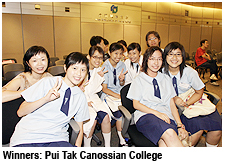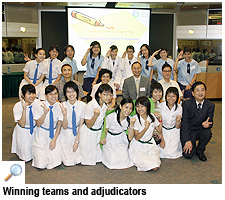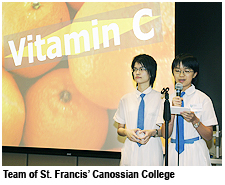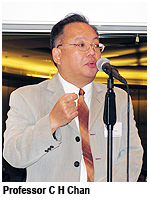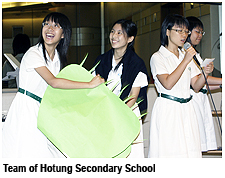FSE boosts secondary students' interest in science and engineering
Louis Won
FSE's summer activities included the Project-based Outreach Programme which was jointly organised by the Faculty and the Government's Education and Manpower Bureau. Under the programme, teams of students in Form Four or above conducted science and engineering-related study projects during the summer holidays. The projects were supervised by CityU's academic staff and secondary school teachers. The Faculty's students also participated by taking up the role of mentor to help the teams to carry out their work.
A total of 17 teams from 11 secondary schools took part in the outreach programme. After three months of hard work, the teams came to CityU's campus for the final presentation day on 17 September (Saturday).
The teams reported on their projects and shared their accomplishments in front of four adjudicators and other teams. The adjudicators included Mr Wong Chung-po, Senior Curriculum Development Officer of the Education and Manpower Bureau; Professor Lilian Vrijmoed of the Department of Biology and Chemistry, who is also Dean of Student Learning; Professor Henry Chung of the Department of Electronic Engineering; and Dr Alan Chan, Associate Professor of the Department of Manufacturing Engineering and Engineering Management.The best presentation award went to the team from
Speaking at the event, Professor C H Chan, FSE Dean, said the objective of the outreach programme was to enhance secondary school students' interest in science and engineering. Professor Chan said a lot of students chose to study business when they entered university even though they were science students in secondary school. As a result, he added,
"If everybody goes to business school and no one works in the sectors that create wealth, there would not be much demand for services," he said.
Professor Chan said he hoped the outreach programme would encourage young people to develop their future careers in science and engineering, so that more people would participate in wealth creation for
Ms Lau Sau-king, who teaches in the
"By conducting the project, the students can apply the theories they learned in class," she said. "It's also a good programme to help the students to develop a critical mind."
Ms Lau's student Lam Kit-ching said she had learned a lot by participating in the outreach programme.
"It's not like what we usually do in class," she said. "Instead of following instructions in textbooks, we needed to be very creative when conducting our project and solving the problems we ran into."
"The secondary school students could carry out the experiments themselves to find out the answers to their own questions," he said. "It is a lot more interesting than looking for the answers in textbooks."
